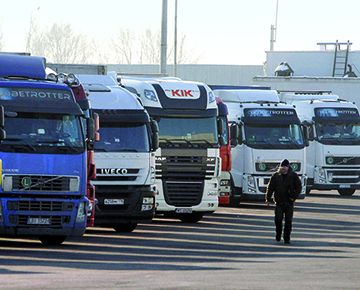
Trucks crossing Belarusian-Polish border, at Kozlovichi border checkpoint
Now, the situation has changed. Recently, the Eurasian Economic Commission reported that the establishment of the Customs Union has seen transit of cargo through Belarus almost quadruple, thanks to the quality of logistical services and the optimisation of customs procedures. We can assume that this indicator pleases not only domestic hauliers but the Belarusian Government, whose budget benefits from revenue from transit.
Our hauliers are a driving force within the economy, at a time when Belarusian production enterprises face difficulties. Export services relating to transport currently generate almost 60 percent of total export revenue in the sphere of services, making a worthy contribution to the budget. Nevertheless, the EEU Integration Committee suggests that only half Belarus’ potential is being used (compared to Kazakhstan carriers and logistical operators working at 28 percent capacity and the Russians at 68 percent).
The Head of the Motor and Tractor Department at the Belarusian National Technical University, Doctor of Economics, Professor Roman Ivut, tells us, “The geographical position of the country has long predetermined our transport policy. Being a land-locked state, we are urged to become a transit corridor. After all, the shortest roads connecting CIS countries with Western Europe, and connecting Southern and Central Europe with the northwest regions of Russia and Scandinavia pass through our country.” He sees cargo transportation as a major source of revenue, forming 25 percent of our positive balance.
Our hauliers are a driving force within the economy, at a time when Belarusian production enterprises face difficulties. Export services relating to transport currently generate almost 60 percent of total export revenue in the sphere of services, making a worthy contribution to the budget.
Of course, volumes could be greater, especially as no difficulties are ‘unsolvable’. Within the customs ‘troika’, we may yet see a unified system of automobile transportation into third countries. The question will be tackled by separate agreements, via paired and tripartite negotiations. Recently, the ministers of transport of Belarus and Russia have agreed on stage-by-stage quotas for Belarusian carriers, initiating over the coming three years. Certain arrangements have been reached, including with Kazakhstan. The EEU Integration Committee has agreed to allow internal cargo transportations within the EurAsEC, including transit through the territory of partner countries, without formal authorisation. Belarusian hauliers will thus be able to deliver domestic goods to Russia and Kazakhstan without restrictions. However, to transport cargo from or into third countries, they need permission, as before.
Sadly, a serious barrier remains to true liberalisation of transport services, since Russia continues to differentiate third countries by category, pushing aside Belarus from the most favourable international routes. Hauliers have hopes that the EEU will bring a unified market for transport services, allowing Belarusian companies to receive free access to the Russian market. This would at least double volumes of cargo transportation. We yet await liberalisation of transportation into the EEU, despite persistent requests from Belarus. Our partners within the Customs Union, Kazakhstan and Russia, are afraid of more prepared competitors, leading them to postpone a decision. Therefore, our hauliers are obliged to act as ‘foreigners’ in transporting cargo from third countries through the EEU, applying for formal permission from Russia and Kazakhstan. Bilateral agreements exist between Belarus and Russia, but those between Belarus and Kazakhstan are still to be ratified.
The same complexities exist concerning cargo transportation across Western Europe. Belarusian vehicles need permission to make deliveries from Germany into Russia; on average, only one permit per year is granted per vehicle although each is capable of making more than 20 trips. The Eurasian market of transport from third countries is thereby occupied by competitors from the EU.
Russia has promised to transfer all permissions needed into/from third countries to Belarusian international hauliers this year, to satisfy their needs.
By Alexander Benkovsky











